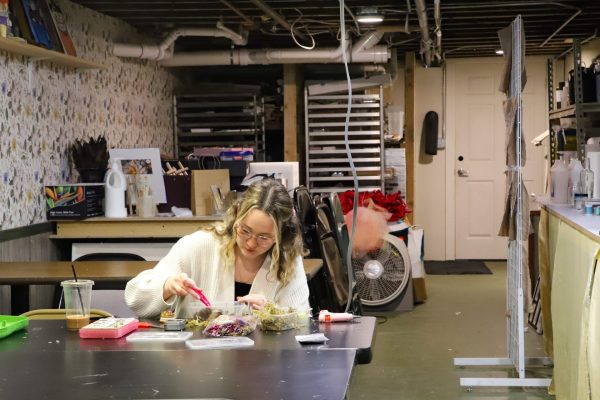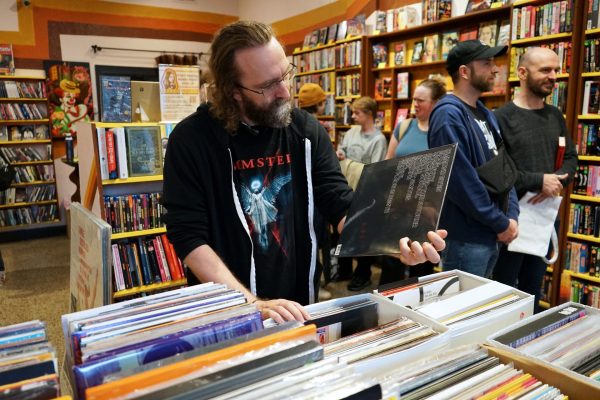DePaul students face uncertainty while picking fall quarter classes
With week eight beckoning for DePaul students, many have also been busy selecting classes for fall quarter. However, the COVID-19 pandemic has complicated the process for many students and uncertainty remains over the status of in-person, on-campus classes.
Professors have also had to adapt and switch up classes to fit an online curriculum while also dealing with the tradeoffs between online and in person learning.
In a letter posted on DePaul Newsline, President Gabriel Esteban announced that the university is planning to reopen in a limited capacity, which would include some in-person learning along with reduced numbers of on-campus residents.
While some classes may be held in person, President Esteban also said that “more classes than usual will continue to take place at least partially online.”
The university will also take into account the policies government and public health departments will have in place when making further decisions, according to Esteban.
Uncertainty about the fall quarter has led some underclassmen to consider taking some classes at a later time, while other students have also had to think twice about some classes that would be better in person.
“I am absolutely holding off taking certain classes in the fall,” said freshman Cecil Lay. “I tried to sign up on the assumption that we will be fully online in the fall and stuck at home again.” It was pretty tough to choose which classes to take because I’d prefer to take most of my major-related classes in-person, especially the hands-on classes such as production.”
Alyssa Hollendoner, a freshman who is double majoring in psychology and Spanish, also said that she had to think twice about classes that have labs.
“I was uncertain about taking my BIO 191 class online because it includes the lab portion, however, my roommate worked hard through it and I believe I can too in order to get all my credits done at the rate I intend to,” Hollendoner said.
At the beginning of the spring quarter, working fully online was trickier for some students, but most were able to adapt a few weeks in.
“It was a difficult switch without having lectures, and to substitute, a majority of my classes assigned multiple readings in order to receive the same information,” she said. “The issue with this is that the lengthy readings then fill my study time along with the time for my responsibilities that I have at home and for myself. Moreover, throughout the quarter it became easier once I modified how to take notes, study, and manage my time.”
Ben Courtney, a junior who is majoring in special education, had a similar experience.
“Other than a short learning curve at the beginning of the quarter where I needed to constantly check on when assignments were due because I wasn’t seeing teachers twice a week so they could tell me, the format hasn’t been too difficult,” Courtney said.
Courtney said that while he was able to acclimate to the online courses, it may have been because he has experience taking online classes already.
“I’ve taken fully online courses before during the winter intersession though, so I think I may have just had a better feel for what online classes would be like than other students,” he said.
On the other hand, some students have struggled with the switch to online learning due to the lack of an in-person classroom feel.
“I very much appreciate the effort my teachers are putting in, but a classroom environment simply cannot be replicated on Zoom or D2L,” Lay said. “I’ve made the switch to online learning, but I’d say the biggest issue is simply the lack of human connection and understanding that goes on in an in-person class. These things can’t be recreated on Zoom.”
The lack of student to student and student to professor interaction is also an issue that has affected the professors at DePaul. Justin Staley, a senior professional lecturer in the writing, rhetoric and discourse department, said that it is more difficult to conduct strong discussions.
“You do not get a chance to develop the same rapport that you have with students as you would in a face to face class,” Staley said. “All my classes are heavily discussion based and when you try to capture that in an online class, especially with written discussion posts, the conversations and discussions can be a little bit stilted, a little bit awkward, a little bit formal.”
He said that it is harder for students to have real conversations and that these discussion boards tend to “take place in a vacuum” rather than happening naturally.
Paul Booth, a professor of media and cinema studies in the College of Communication, also said that while losing the face to face interaction is not ideal, there are ways online classes can be as effective.
“I think online classes are often harder than students (and instructors) think they will be, but they can be just as valuable as in-person classes,” Booth said. “You don’t get the face to face interaction which is really fun, but there are other opportunities that you can take advantage of.”
It is also easier for some students to cope with online classes while others may struggle.
“I think it depends on the student,” Staley said. “It takes a different approach to class. An organization approach. For some students online is not as effective for them.”
However, he continued saying that online classes can also be very beneficial for some students because it allows them to create a good routine while introverted students can also find more success in terms of participating.
Staley also said that online classes also take away a certain face to face interactions that can help him keep students on task.
“I feel like I cannot make fun of students the way I normally do,” he said. “ I like teasing students. I like being able to bust their chops a little bit and get them motivated when they need it. It’s hard to do that in a written way.”








Lance Coardill • May 23, 2020 at 4:39 pm
Covid 19’s unfortunate latent consequence makes DePaul an “also ran” among primarily online learning institutions. My neighbor earned a PhD from Pacific Coast University and professes now to be quite adept, willing and able, to counsel individuals with deep seated psychological issues. No thank you, the last thing I need is to receive services from a five foot Pole I wouldn’t touch with a ten foot Pole.
What, however, I wonder, will differentiate DePaul, say, from Truman College at this point? The quality of the internet connection/bandwidth over wich classes will be taught? A $55,000 a year online experience does not a happy and content student make from a university that seems more a marketing machine than instution of higher learning.